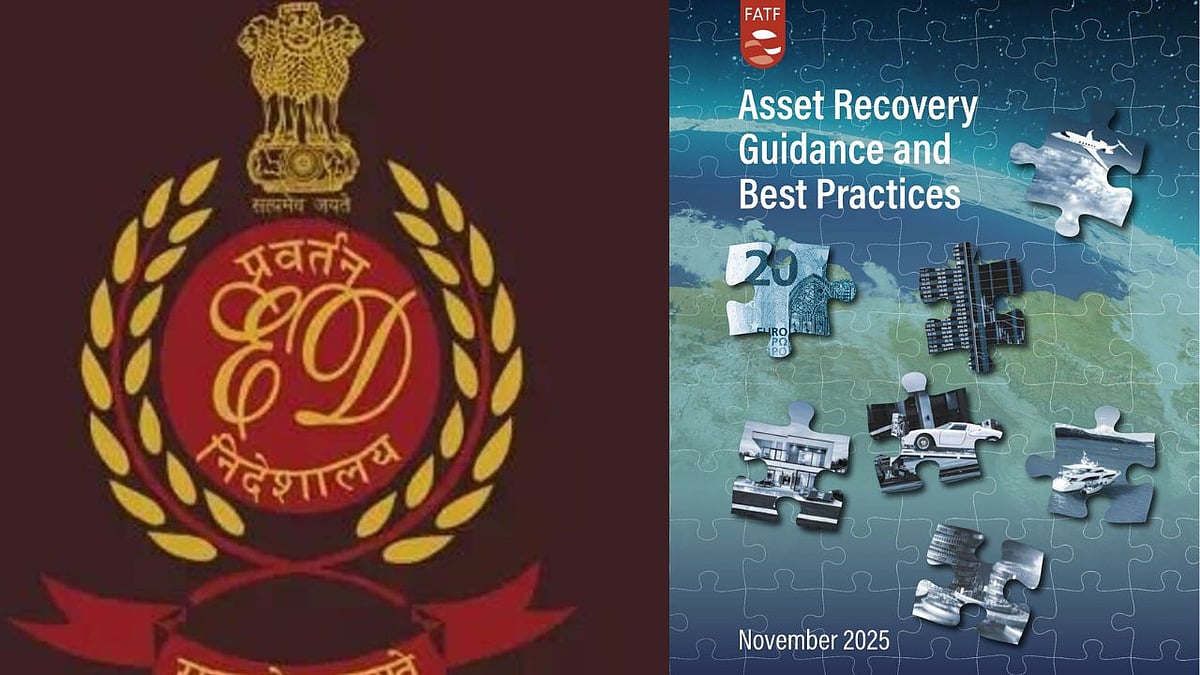FATF Report Puts ED Among Global Leaders In Asset Recovery, Describes It As A Model Investigative Agency For Tracing Proceeds Of Crime
The FATF report highlights India’s Enforcement Directorate (ED) as a model institution demonstrating how a developing economy can effectively trace, freeze, and confiscate criminal proceeds while upholding due process.

FATF Report Puts ED Among Global Leaders In Asset Recovery, Describes It As Model Investigative Agency For Tracing Proceeds Of Crime |
The Financial Action Task Force (FATF),the global watchdog for anti-money laundering and counter-terrorism financing, has praised India for its “mature, transparent and internationally compliant” asset recovery regime in its latest Asset Recovery Guidance and Best Practices 2025. The FATF report highlights India’s Enforcement Directorate (ED) as a model institution demonstrating how a developing economy can effectively trace, freeze, and confiscate criminal proceeds while upholding due process.
The report, published in Paris in November 2025, notes that India’s comprehensive approach under the Prevention of Money Laundering Act (PMLA) and Fugitive Economic Offenders Act (FEOA) aligns with the FATF’s revised Recommendations 4 and 38, emphasizing non-conviction-based confiscation, swift provisional measures, and cross-border cooperation. “India’s Enforcement Directorate has emerged as a leading example of an operationally strong and legally balanced agency in the asset recovery domain,” FATF stated. “Its framework to identify, freeze, and confiscate criminal property has produced tangible results in high-value cases of money laundering, economic offences, and terror financing.”
The FATF report included several India-related case studies illustrating the ED’s success in recovering criminal proceeds and redirecting them for public benefit. In one such case, the ED unearthed a large-scale bank fraud involving cooperative bank officials and auditors who manipulated accounts and siphoned depositors’ money through benami accounts. Acting under PMLA, the agency attached assets worth Rs 2.9 billion (USD 33.2 million) and transferred them to the Maharashtra Protection of Interest of Depositors (MPID) authority for liquidation and victim compensation. The FATF highlighted this case as a model example of how India’s asset recovery framework not only recovers illicit proceeds but also channels them into socially beneficial projects.
FATF also praised India’s quick response to a Mutual Legal Assistance (MLA) request from the United States, which was investigating two Indian nationals for drug trafficking and money laundering offences. The ED seized 268.22 bitcoins valued at Rs 1,300 crore (USD 29 million) and attached immovable assets worth Rs 92 crore (USD 1.1 million). FATF termed this a “model of rapid and effective international cooperation in asset recovery.”
Another case featured in FATF’s report highlighted a Ponzi-style investment fraud, where investors were lured with promises of high returns or land parcels. The ED and the Crime Investigation Department (CID) jointly resolved overlapping asset attachment issues through coordination meetings and returned assets worth ₹6,000 crore (USD 690 million) to the CID for investor repayment. FATF described this as a “best practice in domestic cooperation.”
In a separate real estate case, the ED found that a developer diverted homebuyers’ funds abroad using shell companies, loans to associates and falsified accounts. Applying the PMLA, the agency identified equivalent domestic properties and attached assets worth Rs 1,777 crore (USD 204 million) as “corresponding-value property.” FATF praised this as a textbook example of value-based confiscation in line with international recommendations.
Collectively, these cases demonstrate India’s strong legal architecture, coordinated enforcement, and victim-centric restitution, the FATF said. “India’s Enforcement Directorate provides a clear model for jurisdictions seeking to strengthen asset recovery regimes,” the report concluded, highlighting its “operational speed, procedural fairness, and tangible social impact.”
Collectively, the FATF report said, these examples underscore India’s strong legal architecture, coordinated enforcement and judicial oversight in the recovery of criminal proceeds. The global watchdog also noted India’s “swift use of provisional measures, transparent asset management, and victim-centric restitution.” “India’s ED provides a clear model for jurisdictions seeking to strengthen asset-recovery regimes,” the FATF concluded. With its record of successful recoveries, India’s Enforcement Directorate now stands among the world’s top-performing agencies in asset recovery, alongside those in the United States, Italy and Singapore.
RECENT STORIES
-
-
-
-
-